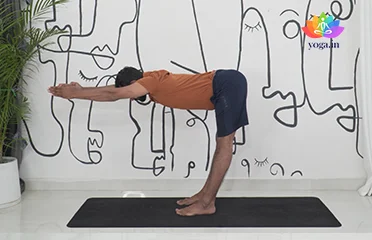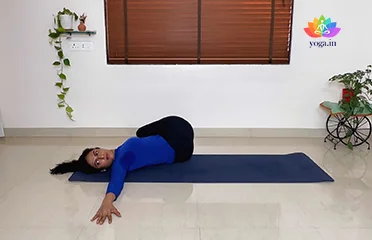Pawanmuktasana (Wind Release Pose)
पवनमुक्तासन / Wind Release Pose
The Sanskrit name is derived from Pawan (पवन) meaning wind or gas, Mukta [�K]
Pincha Mayurasana (Peacock Feather Pose)
पिंचमयूरासन / Peacock Feather Pose
The Sanskrit name is derived from Pincha (पिंच) meaning feathered, Mayur [�K]
Prasaritta Padottanasana (Wide-Legged Fo
प्रसारिता पदोत्तनासन / Wide-Legged Forward Bend
The Sanskrit name is derived from Prasārita (प्रसारित) meaning [�K]
Samakonasana (The Right-Angle Posture)
समकोणासन / The Right-Angle Posture
The Sanskrit name is derived from Sama (समा) meaning straight, Kona meaning [�K]
Setubandhasana (Bridge Pose)
सेतु बन्धासन / Bridge Pose
The Sanskrit name is derived from Setu (सेतु) meaning bridge, Bandha [�K]
Shalabhasana (Locust Pose)
सलभासन / Locust Pose
The Sanskrit name is derived from Shalabha (शलभा) meaning locust and [�K]
Simhasana (Lion Pose)
सिंहासना / Lion Pose
The Sanskrit name is derived from Simha (सिंहा) which means lion and [�K]
Sirsasana (Headstand)
शीर्षासन / Headstand
The Sanskrit name is derived from Sirsa (शीर्ष) meaning head and asana [�K]
Supta Matsyendrasana (Supine Spinal Twis
सुप्त मत्स्येन्द्रासन / Supine Spinal Twist Pose
The Sanskrit name is derived from Supta (सुप्त) means supine, Matsya [�K]
Supta Padangusthasana (Reclining Posture
सुप्त पदंगुष्टासन / Reclining Posture
The Sanskrit name is derived from Supta (सुप्त) meaning 'supine or [�K]
- 1
- 2
- 3
- 4
- 5
- ...
- 6
- 7
Yoga Poses for Pelvic Health: Find Strength and Relief
The pelvic floor muscles are a hammock of muscles that support your bladder, bowels, and reproductive organs. Strong pelvic floor muscles contribute to overall urinary and bowel control, sexual health, and core stability. Yoga offers a range of poses and practices that can benefit your pelvic health.
Understanding Your Pelvic Floor:
Your pelvic floor is like a hidden core, and just like any other muscle group, it needs to be exercised to stay strong and healthy. Weak pelvic floor muscles can lead to issues like incontinence, pelvic organ prolapse, and pain.
Yoga’s Role in Pelvic Health:
Yoga offers several benefits for pelvic health:
- Strengthens Pelvic Floor: Certain yoga poses engage and strengthen the pelvic floor muscles, improving control and reducing leakage.
- Improves Circulation: Gentle movements and breathing exercises enhance blood flow to the pelvic region, promoting healing and reducing pain.
- Reduces Stress: Stress can worsen pelvic floor dysfunction. Yoga’s calming nature promotes relaxation and stress reduction, which can improve overall pelvic health.
Key Factors Affecting Pelvic Health:
Several factors can affect your pelvic floor health, including:
- Pregnancy and Childbirth: Pregnancy and childbirth can stretch and weaken the pelvic floor muscles.
- Age: As we age, our pelvic floor muscles naturally weaken.
- Weight: Excess weight puts extra strain on the pelvic floor.
- Chronic Coughing: Activities like chronic coughing can weaken the pelvic floor.
- Lifestyle: Lack of exercise and poor posture can contribute to pelvic floor issues.
Symptoms of Pelvic Floor Dysfunction:
Common symptoms of pelvic floor dysfunction include:
- Urinary Incontinence: Leaking urine unintentionally, such as with coughing or sneezing.
- Pelvic Organ Prolapse: Organs in the pelvis dropping down into the vagina.
- Pelvic Pain: Pain in the lower abdomen, genitals, or lower back.
- Constipation: Difficulty passing stool.
- Painful Intercourse: Discomfort during sexual activity.
Treatment of Pelvic Floor Dysfunction through Yoga and Pranayama:
Here are some specific yoga poses and pranayama exercises beneficial for pelvic health:
- Kegel Exercises: These targeted contractions strengthen the pelvic floor muscles. You can incorporate them into various yoga poses.
- Bridge Pose (Setu Bandhasana): Opens the hips and strengthens the pelvic floor muscles.
- Child’s Pose (Balasana): Promotes relaxation and relieves pelvic tension.
- Garland Pose (Malasana): Strengthens the legs and core, indirectly supporting the pelvic floor.
- Deep Breathing (Pranayama): Improves circulation and promotes relaxation, beneficial for overall pelvic health.
Diet for Pelvic Health:
A healthy vegetarian diet rich in fiber and fluids can help maintain bowel regularity and reduce straining, which can benefit your pelvic floor. Here are some dietary recommendations:
- Hydration: Drink plenty of water throughout the day to stay hydrated. Dehydration can contribute to constipation, so ensure you’re consuming enough fluids.
- High-Fiber Vegetables: Include a variety of high-fiber vegetables in your diet, such as broccoli, Brussels sprouts, okra, lentils, and beans. Fiber helps soften stool and promotes regularity.
- Whole Grains: Opt for whole grains like brown rice, quinoa, and whole-wheat bread over refined grains. Whole grains provide sustained energy and additional fiber.
- Fruits: Include fruits like berries, pears, and apples in your diet. Fruits offer essential vitamins, minerals, and additional fiber to support digestion.
- Healthy Fats: Don’t shy away from healthy fats found in nuts, seeds, and avocados. Healthy fats can aid in nutrient absorption and promote a feeling of fullness.
Caution for Pelvic Floor Yoga:
Listen to your body! If you experience any pain or discomfort during yoga practice, stop the pose and consult a doctor or certified yoga therapist before continuing.
Contraindications for Pelvic Floor Yoga:
Certain medical conditions might require modifications or avoidance of specific yoga poses. Always consult your doctor before starting a new yoga practice, especially if you have:
- Pelvic Organ Prolapse: Some poses may worsen symptoms.
- Recent Surgery: Wait for proper healing before practicing yoga.
- Severe Pelvic Pain: Avoid poses that aggravate pain.











